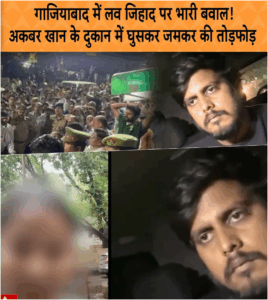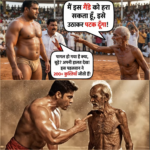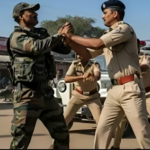Love Jihad Controversy Sparks Chaos in Ghaziabad: The Tale of Sonika Chauhan and Akbar Khan
In the bustling city of Ghaziabad, Uttar Pradesh, a storm of controversy has erupted, drawing national attention to the heated issue of “Love Jihad.” This term, often used to describe alleged cases of Muslim men marrying Hindu women and converting them to Islam, has once again fueled communal tensions in the region. At the center of this storm are Sonika Chauhan and her husband, Akbar Khan, whose love story has become a battleground for ideological and familial conflicts.
.
.
.

The Incident
The chaos began when a group of individuals associated with Hindu organizations, including the RSS and Bajrang Dal, vandalized Akbar Khan’s shop in the Indirapuram area. The attack was reportedly provoked by allegations against Akbar, accusing him of kidnapping and forcibly marrying Sonika under the guise of Love Jihad. This accusation was initially brought forth by Sonika’s parents, who filed a complaint with the local police, leading to Akbar’s arrest.
Sonika’s Stand
In the midst of this turmoil, Sonika Chauhan released a video that quickly went viral. In the video, she vehemently defends her husband, declaring him innocent of the charges. “I, Sonika Chauhan, have known Akbar Khan for nine years. We married three years ago under the Special Marriage Act,” she stated, emphasizing the legality and mutual consent of their union. Sonika accused the Hindu organizations of threatening her to divorce Akbar, under the threat of violence.
Sonika’s video paints a distressing picture of familial pressure and societal backlash. She recounted how her own parents had resorted to physical violence to coerce her into leaving Akbar. “My mother threatened to kill me and Akbar if I didn’t return home,” she revealed, highlighting the intense personal conflict she faces.
The Family’s Allegations
Sonika’s parents have been vocal in their opposition to her marriage with Akbar. They allege that their daughter was abducted and manipulated into the relationship, a claim that Sonika denies. Her father lodged a formal complaint, accusing Akbar of kidnapping and holding Sonika against her will. Despite these allegations, Sonika insists that her relationship with Akbar is consensual and rooted in mutual love and respect.
Community Reaction
The incident has sparked a fierce debate in the community, drawing sharp lines between those who support Sonika and Akbar’s right to choose their life partners freely, and those who see the marriage as a case of Love Jihad. The vandalism of Akbar’s shop has been condemned by many as an act of intolerance and violence, while others view it as a justified response to what they perceive as a cultural threat.
Legal and Social Implications
The case has significant legal and social implications. Under the Special Marriage Act, Sonika and Akbar’s marriage is legally recognized, yet the lack of public documentation has fueled skepticism and rumors. This situation underscores the challenges faced by interfaith couples in India, where societal and familial pressures often complicate their legal rights and personal choices.
The police have been drawn into the controversy, tasked with navigating the delicate balance between enforcing the law and managing communal tensions. The investigation into the vandalism and the allegations against Akbar is ongoing, with authorities urging calm and restraint from all parties involved.
Sonika’s Plea for Justice
In her video, Sonika makes a heartfelt plea for justice and protection. “I am an adult and fully aware of my choices. I went with my husband of my own free will. We have been receiving threats, and I urge the authorities to take strict action against those responsible,” she asserted, calling for an end to the harassment and threats against her and Akbar.
The Broader Context
The controversy in Ghaziabad is emblematic of the broader societal tensions surrounding interfaith marriages in India. The term “Love Jihad” has been a flashpoint in the country, often used to stoke fears of religious conversion and cultural erosion. This case highlights the personal and social challenges faced by couples who defy traditional norms and choose partners outside their faith.
PLAY VIDEO:
Conclusion
As the dust settles in Ghaziabad, the story of Sonika and Akbar remains a poignant reminder of the complexities of love and identity in contemporary India. Their struggle for acceptance and safety is not just a personal battle but a reflection of the broader societal dynamics at play. As the investigation continues, their story serves as a call for empathy, understanding, and the protection of individual rights in the face of communal pressures.
The outcome of this case could set a precedent for how similar situations are handled in the future, potentially influencing the discourse around interfaith marriages and the rights of individuals to choose their partners freely. For Sonika and Akbar, the hope is that their love will transcend the barriers of prejudice and fear, paving the way for a more inclusive and tolerant society.
News
Missing PG Student Monica from Darbhanga CM College Found in Shocking Condition—Police Stunned
Missing Darbhanga CM College Student Monica Found Safe—Reveals She Left Home Willingly to Marry A week-long mystery surrounding the disappearance…
Chaos on the Kanwar Yatra: Devotees Go on Rampage, Vandalize Dhaba from Muzaffarnagar to Roorkee!
Kanwar Yatra Turns Violent: Kanwariyas Vandalize Dhabas from Muzaffarnagar to Roorkee Over Onion in Food A shocking wave of violence…
Uproar After Samajwadi Party Leader Sunil Yadav’s Death: Ex-MLA and Brother-in-Law Named in FIR!
Uproar in Sultanpur After Samajwadi Party Leader Sunil Yadav’s Mysterious Death: Former MLA and Brother-in-Law Named in FIR A wave…
Shocking Viral Video: Teacher Beats Student with Stick in Bihar School—Discipline or Violence?
Bihar School Turns Battleground: Viral Video Shows Teacher Beaten Brutally by Angry Parents—Discipline or Violence? A shocking video has taken…
Forced to Strip at Knifepoint: Obscenity in the Name of Jobs—What’s Happening in Uttar Pradesh?
Job Promise Turns Nightmare: Woman Forced to Undress at Knifepoint in Uttar Pradesh Official’s Quarters Uttar Pradesh: A shocking video…
UP Education Minister Injured in Road Accident as Convoy Cars Collide
UP Education Minister Gulab Devi Injured in Road Accident as Convoy Cars Collide Hapur, Uttar Pradesh: Uttar Pradesh’s Education Minister,…
End of content
No more pages to load












